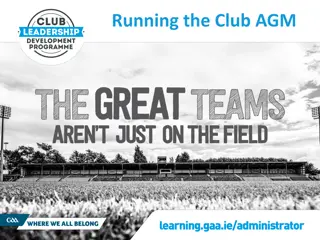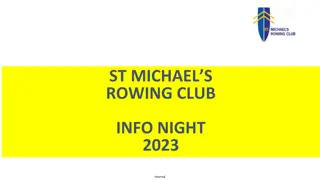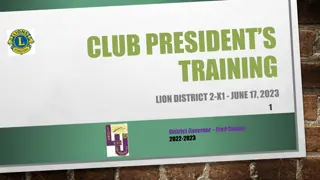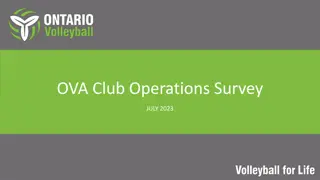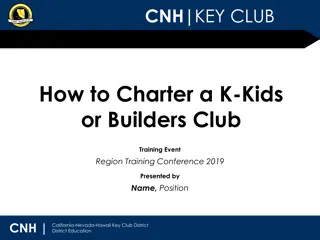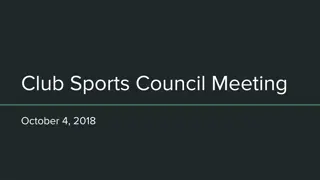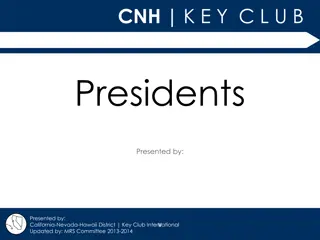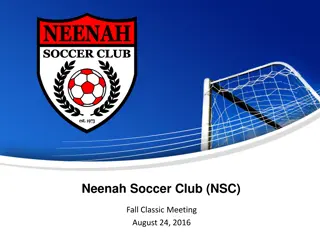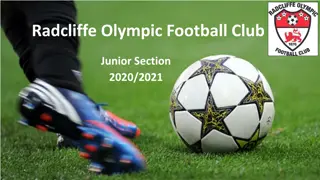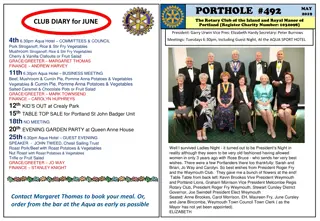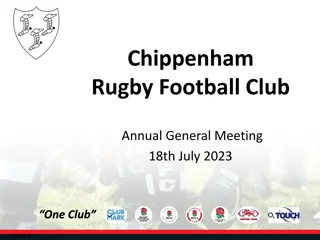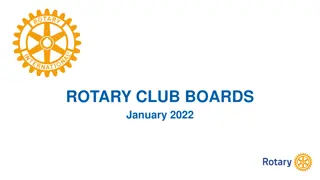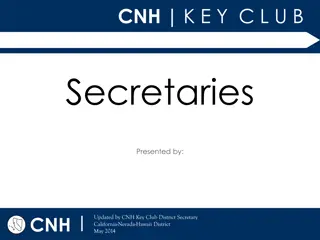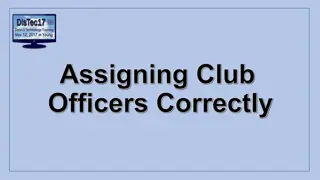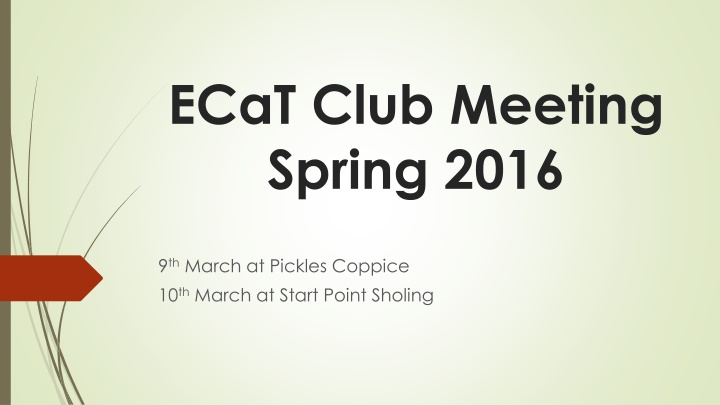
Strategies for Setting Up Narrative Groups in Children's Settings
Learn about strategies and support available for setting up narrative groups in children's settings, including identifying appropriate participants, resources, and feedback on using the Narrative Approach. Access support from Solent NHS SLTA Tina Doherty to mentor practitioners in running narrative groups effectively.
Download Presentation

Please find below an Image/Link to download the presentation.
The content on the website is provided AS IS for your information and personal use only. It may not be sold, licensed, or shared on other websites without obtaining consent from the author. If you encounter any issues during the download, it is possible that the publisher has removed the file from their server.
You are allowed to download the files provided on this website for personal or commercial use, subject to the condition that they are used lawfully. All files are the property of their respective owners.
The content on the website is provided AS IS for your information and personal use only. It may not be sold, licensed, or shared on other websites without obtaining consent from the author.
E N D
Presentation Transcript
ECaT Club Meeting Spring 2016 9thMarch at Pickles Coppice 10thMarch at Start Point Sholing
Feedback from Autumn Club Gap Task: How did you get on with sharing & using the signed version of Humpty Dumpty? Lets talk Narrative groups & the Narrative Approach: - Identification of appropriate children for groups [number of sessions attended/stability of group participants/how identified] - Ring-fenced time & place [needs leader/manager on board] - Group resources [prepared & readily available] - Planning already done! - Who is delivering the groups? [opportunities for shadowing etc?] - Narrative Workshop available [1 hour approx] from Jan - How to record progress & show impact? pre & post data e.g. picture description task [ Pre: it done that Post: that a goose it s flapping its wings] - This is an Approach i.e evidenced best practise: you are NOT doing Narrative Therapy
Support for Narrative Groups from Solent NHS SLTA Tina Doherty is SLTA who covers Southampton She is offering 4 sessions of support to settings who request it, to help set up & observe practitioners in settings running narrative groups as long as there is at least ONE CHILD in the setting who has SLT support/programme/targets that include narrative work Tina s role is NOT to run narrative groups for you; she is able to mentor/coach/support the practitioner(s) who are taking it on The 4 sessions will work like this: 1. Tina will run TWO sessions for you to observe [children already selected; not necessarily from beginning if you have already started; within same week] 2. Then there will be a gap [to be negotiated with Tina} of a few weeks 3. Tina will support you running one session, then observe another [offer guidance/advice etc if needed]
Accessing Support From Tina Several settings have already indicated their interest but of those only 6 settings actually have an appropriate SLT caseload child, which is the crucial factor To request support, please contact Jan via email: jan.stevens@southampton.gov.uk I will then contact Tina, who will confirm whether she is able to help that setting Tina will then contact the setting to make arrangements Tina s work is supported by 2 SLTs in the city: Kylie Muir-Webb on the West & Michelle Riceman on the East PLEASE DON T PUT OFF STARTING TO RUN NARRATIVE GROUPS EITHER IF YOU CAN T ACCESS TINA OR IF YOU RE WAITING FOR HER TO START WITH YOU!!!!! This is potentially a successful way to support reasonably large numbers of your At Risk of Delay children: it s evidence-based; it s straightforward; it s fun IT WORKS!!!!
Resources Jake & Tizzy: series of 8 books, based on everyday familiar activities that children find easy to relate to; they are specifically designed to support language development at preschool; available from ICAN 39.99 www.ican.org.uk Particularly good for your funded 2 year olds perhaps? INTEGRATED REVIEW http://ncb.org.uk/media/1201160/ncb_integrated_revie w_supporting_materials_for_practitioners_march_2015.p df
Training Opportunities Makaton Taster Sessions in 2016: take leaflet/booking form if you are interested (especially if you have a child/children in your setting for whom MAKATON signing has been recommended by the Solent NHS SLT ECaT Training Options in 2016: Universal Phase 1: offered to whole staff teams or as Catch-Up for practitioners new to the setting essential INITIAL ECaT course: 3 hrs or twilights Universal Phase 2: currently offered only to whole staff teams: 3 hrs or twilights Introduction to Signing & Communication: offered to whole staff teams or as Catch-Up for practitioners new to the setting: 3hrs or twilights
Audit Guidance Booklet produced by Sally: examples on tables Available as a Word document, will be sent out as an attachment with the Club minutes Any burning concerns about the audit? Any difficulties around the spreadsheet from ANYCOMS Next data collection: from Monday 13thJune 2016 please ensure forms are returned to ANYCOMS by the end of that week if possible
Delving into the Roots Thinking about the ECaT Tree: The roots of communication development from birth are: Listening & Attention; Social Communication These skills are ESSENTIAL pre-linguistic skills that form the foundation for the development of later more obvious language skills Listening skills: including localisation of sound, identification of different sounds, development of auditory discrimination skills Attention skills: including supporting & extending attention span [Reynell], developing focused joint attention & Shared Sustained Thinking Social Communication skills: including eye contact & turn taking
Building Blocks for Early Communication development Communication between 2 people involves looking at each other, listening & attending to the other person & waiting for your turn to respond Young children often have difficulties in one or more of these pre-linguistic areas Link to ECaT Child Monitoring Tool
Eye Contact Poor or fleeting eye contact affects normal social interaction. Looking at the speaker s face provides important information about language through facial expression, gestures etc. Prolonging eye contact is an important skill that needs to be developed before true communication can begin
Turn Taking Turn taking is very important in the development of communication If people talk together & don t wait their turn, there is communicative breakdown This skill normally develops early in infants, from birth, long before they can talk Many children have poorly developed turn taking skills
Attention Working on attention aims to extend the time a child can attend to or concentrate on an activity There is a hierarchy of ability in this area, from attending to the child s own choice of activity, to an adult directed activity in a 1-1 situation, then to attending in a group activity Poor attention skills impinge on every aspect of learning, but in particular a child needs a reasonable level of attention control before he/she can begin to understand language
Listening The ability to detect sound & attach meaning to it is the most important basic fundamental building block for language development Many children have poor listening skills which affects their ability to learn & understand the spoken word Work in this area will have a huge impact on language development
Language Through Listening Activity Pack A pack of activities & ideas to develop pre-linguistic skills in preschool children Activities described & picture resources provided Ideally the activities will be offered to small groups of children frequently but for short periods of time Need to consider location, as may need to reduce background noise & visual distractions Lots of repetition will be required for each activity Planning for 6 group sessions are included Published by Black Sheep press Available as a pdf which we will send out with the Club minutes HAVE A LOOK THROUGH THE PACKS What do you think? Can you see already how you might use this pack in your setting?
The Bucket Approach Over to Diana !
Signed Nursery Rhyme Baa Baa Black Sheep
The ECaT Big Share Your opportunity to share any successes, changes in practice or thinking as a result of an ECaT related activity or event
ECaT Club Dates Tuesday 5thJuly 2016: 9.30-11.30 am at Start Point Sholing Tuesday 5thJuly 2016: 12.30-2.30 pm at Start Point Sholing Wednesday 6thJuly 2016: 9.30-11.30 am at Pickles Coppice
Gap Task Share Language Through Listening Pack with your team Use at least 3 of the activities in the pack with individual children or with a small group Aim to work through the 6 group sessions with at least 1 identified group of children between now & the next Club meeting in July Tell us how it went next time what worked well, what wasn t so good & why you have come to these conclusions

